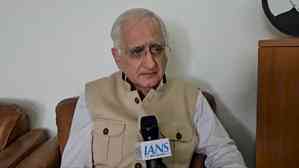'India need not learn from Pakistan', Khurshid challenges BJP’s Waqf Board comparison (IANS Interview)
In response to a query during an interview with IANS on BJP's claim that the Waqf Board in India holds more powers than similar institutions in countries like Pakistan, Congress leader and former Union Minister Salman Khurshid said on Friday that Pakistan should view India as a model to learn from, rather than the other way around.

New Delhi, Aug 9 (IANS) In response to a query during an interview with IANS on BJP's claim that the Waqf Board in India holds more powers than similar institutions in countries like Pakistan, Congress leader and former Union Minister Salman Khurshid said on Friday that Pakistan should view India as a model to learn from, rather than the other way around.
“Why are we talking about Pakistan? Should we learn everything from Pakistan? Pakistan should be learning from us! We should focus on what our elders considered right and did. Ultimately, the courts oversee everything, and a tribunal is also a type of court. If the government doesn’t trust the courts, it should say that openly instead of only trusting their Collectors,” Khurshid argued during his conversation with IANS.
Khurshid also emphasised the importance of discussing the key issues, such as the Waqf (Amendment) Bill, thoroughly before implementing any changes claimed to be for public good.
On the Waqf (Amendment) Bill, Khurshid noted that while it is preferable to voice opinions during the Joint Parliamentary Committee's review, he would still make some submissions on the matter due to its significance to the public.
“I believe the Parliament will carefully consider it. I want to highlight that there is a certain atmosphere in the country right now where it feels like efforts are being made to interfere with the institutions which are connected to minorities,” said Khurshid.
“Whether it is the discussion on the Uniform Civil Code (UCC), madrasas, or any other issues related to minorities, such as scholarships from the Maulana Azad Foundation, many decisions are being made that indicates that the government wants to restrict the rights and institutions of minorities,” he claimed.
On AAP leader Manish Sisodia being granted bail by the Supreme Court, the former Union Minister said, “The court grants bail after careful consideration. If the court granted bail after 17 months, it must have deemed that 17 months are more than enough. If the trial hasn’t progressed in such a long time, more time will just pass; it is the responsibility of the prosecution to expedite the case.”
“As far as I understand, the court stated that the delay in this case was not Manish Sisodia’s fault, which is why he was granted bail. This bail doesn’t indicate that the charges against him were either correct or incorrect. Bail was granted so the case could proceed and evidence could be presented,” he added.
--IANS
brt/arm


 IANS
IANS 








